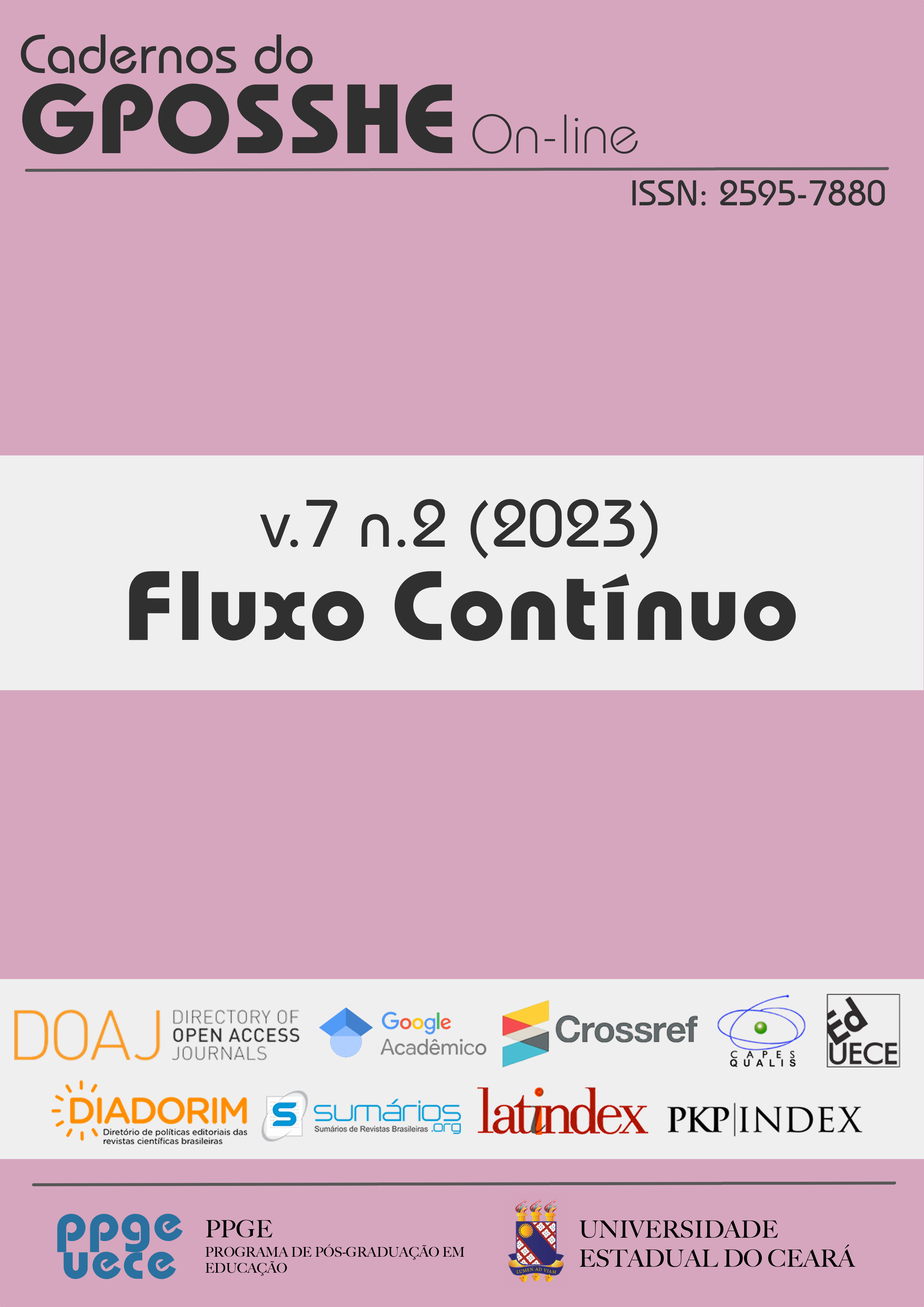Proposta didática do Teorema de Pitágoras na perspectiva da Aprendizagem Significativa de Ausubel
DOI:
https://doi.org/10.33241/cadernosdogposshe.v7i2.11776Palavras-chave:
Teorema de Pitágoras; Teoria de David Ausubel; Aprendizagem Significativa.Resumo
O presente artigo tem como objetivo apresentar a concepção e implementação do tópico de Geometria na visão da teoria pedagógica de Ausubel, como uma proposta didática para o do Teorema de Pitágoras por meio da Aprendizagem Significativa. Para o alcance do objetivo, foram estruturados os tópicos referentes à história do matemático Pitágoras, a teoria pedagógica da Aprendizagem Significativa de Ausubel, demonstrações do teorema de Pitágoras e aplicações do teorema de Pitágoras na perspectiva da teoria da Aprendizagem Significativa de Ausubel. Em termos metodológicos, a pesquisa foi de natureza aplicada, com uma abordagem qualitativa e exploratória. Dessa forma, constatou-se que as principais conclusões resultantes da experimentação da proposta didática, os benefícios da metodologia de Aprendizagem Significativa no desenvolvimento da geometria, também no desenvolvimento de competências e no desempenho dos estudantes, não só motivam a aprendizagem, mas também motivam o aluno para compreenderem outras teorias da geometria.
Métricas
Referências
AUSUBEL, D. P. A aprendizagem significativa: a teoria de David Ausubel. São Paulo: Moraes, 1982.
BOYER, Carl B. História da Matemática. Editora: Edgard Blücher, São Paulo, 1996.
DI PIERRO NETTO, Scipione. Matemática – conceitos e histórias. São Paulo: Editora Scipione, 1996.
BRASIL, Ministério da Educação. Base Nacional Comum Curricular. Brasília, 2018.
BRASIL (2019). PISA 2018. Relatório Nacional. Brasília, DF: INEP/MEC.
EVES, Howard. - Introdução à história da matemática / Howard Eves; tradução Hygino H. Domingues. 5a ed. - Campinas, SP: Editora da Unicamp, 2011.
FONSECA, J. J. S. Metodologia da pesquisa científica. Fortaleza: UEC, 2002. Apostila.
GARBI, Gilberto Geraldo. A Rainha das Ciências: um passeio histórico pelo maravilhoso mundo da Matemática. 5. ed. São Paulo: Livraria da Física, 2010.
GALVÃO, Janaína Teodoro dos Santos. - O ensino do Teorema de Pitágoras: Concepções de professores e uma proposta de abordagem. Campus I – Campina Grande Pró-Reitoria de Pós-Graduação e Pesquisa Programa de Pós-Graduação em Ensino de Ciências e Educação Matemática Mestrado Profissional em Ensino de Ciências. - 2022. 126 p.
GERHARDT, Tatiana Engel; SILVEIRA, Denise Tolfo. Métodos de pesquisa. Plageder, 2009.
MOREIRA, M. A.; MASINI, E. A. F. Aprendizagem significativa: a teoria de David Ausubel. São Paulo: Moraes, 1982.
PEREIRA, Willams Gomes. O jogo Tangram como material lúdico no Ensino da Matemática em geometria plana [manuscrito] / Willams Gomes Pereira. - 2019.
RIBEIRO, Vanessa Vânia Silva Marinho. Revisitando o Teorema de Pitágoras. Viçosa, MG, 2013. Disponível em: https://www.locus.ufv.br/bitstream/123456789/5882/1/texto%20completo.pdf Acesso em 10 de janeiro de 2023. 110 p.
SILVA, J. E. B.; FANTI, E. L. C.; PEDROSO, H. A. Teorema de Pitágoras: extensões e generalizações. Disponível em: C.Q.D. - Revista Eletrônica Paulista de Matemática, Bauru, v. 6, p. 21-47, jul. 2016. Disponível em: https://www.fc.unesp.br/Home/Departamentos/Matematica/revistacqd2228/v06a03-teorema-de-pitagoras.pdf. Acesso em 08 de janeiro de 2023.
SILVA, D. B. P. Proposta para o ensino de semelhança. Rio de Janeiro, 2013.
Downloads
Publicado
Como Citar
Edição
Seção
Licença
Copyright (c) 2023 Cadernos do GPOSSHE On-line

Este trabalho está licenciado sob uma licença Creative Commons Attribution 4.0 International License.
Os autores possuem direitos autorais, sem restrição, aos seus textos. Os Cadernos do GPOSSHE On-line permitem ao autor os direitos de publicação. Os conceitos emitidos em artigos assinados são de absoluta e exclusiva responsabilidade de seus autores.
Todo o conteúdo da Revista Cadernos Gposshe On-Line é aberto para acesso público, propiciando maior visibilidade, alcance e disseminação dos trabalhos publicados.
























